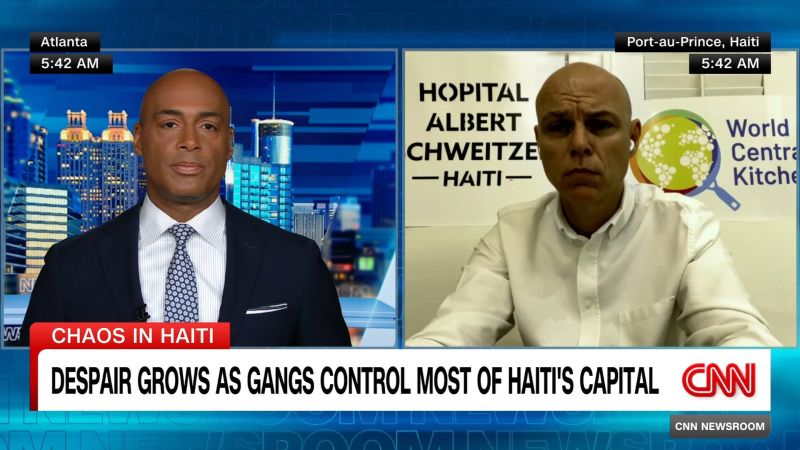April 4, 2024
Haiti’s Growing Hunger Crisis: Aid Workers Raise Alarm on Spreading Food Insecurity Amidst Gang Violence
 In recent years, Haiti has been facing a severe crisis due to the combination of escalating gang violence and the profound issue of hunger plaguing the population. Aid workers on the ground have been raising alarms about the worsening situation, highlighting the urgent need for intervention to address the growing humanitarian crisis.
The escalating gang violence in Haiti has significantly impacted the already dire food security situation in the country. Gangs have been spreading fear and chaos, disrupting essential services, including food distribution networks. As a result, access to food has become increasingly challenging for many vulnerable communities, exacerbating the already precarious living conditions in the country.
Aid organizations operating in Haiti have been struggling to deliver assistance to those in need due to the volatile security situation. The violence perpetrated by gangs not only hinders the distribution of aid but also puts aid workers at risk, further complicating efforts to reach affected populations. This has created a significant barrier to providing essential food and nutrition support to those most in need, pushing more people into the depths of hunger and malnutrition.
Moreover, the economic instability and high levels of poverty in Haiti have contributed to the deepening hunger crisis. With limited access to livelihood opportunities and a lack of basic resources, many families are unable to secure an adequate and consistent food supply. The combination of economic hardship, political turmoil, and environmental challenges has created a perfect storm, leaving a significant portion of the population struggling to meet their basic nutritional needs.
As hunger continues to spread in Haiti, particularly in the context of escalating gang violence, the need for urgent action is more critical than ever. Addressing the root causes of food insecurity, including poverty, social inequality, and lack of access to education and healthcare, is essential to creating a sustainable solution to the crisis. Moreover, efforts to improve security and stability in the country are vital to ensure that aid can reach those who need it most.
In response to the deepening crisis, aid organizations are calling for increased support and resources to scale up humanitarian assistance in Haiti. This includes providing emergency food aid, nutrition support, and livelihood opportunities to vulnerable communities. Collaborative efforts between the government, humanitarian agencies, and local organizations are crucial to effectively address the complex challenges facing Haiti and to prevent further deterioration of the situation.
In conclusion, the intersection of hunger and gang violence in Haiti is a pressing humanitarian crisis that demands immediate attention and action. With millions of people at risk of food insecurity and malnutrition, urgent interventions are needed to protect the most vulnerable populations and prevent a full-scale humanitarian catastrophe. By addressing the root causes of food insecurity and promoting security and stability in the country, we can work towards building a more resilient and food-secure future for the people of Haiti.
In recent years, Haiti has been facing a severe crisis due to the combination of escalating gang violence and the profound issue of hunger plaguing the population. Aid workers on the ground have been raising alarms about the worsening situation, highlighting the urgent need for intervention to address the growing humanitarian crisis.
The escalating gang violence in Haiti has significantly impacted the already dire food security situation in the country. Gangs have been spreading fear and chaos, disrupting essential services, including food distribution networks. As a result, access to food has become increasingly challenging for many vulnerable communities, exacerbating the already precarious living conditions in the country.
Aid organizations operating in Haiti have been struggling to deliver assistance to those in need due to the volatile security situation. The violence perpetrated by gangs not only hinders the distribution of aid but also puts aid workers at risk, further complicating efforts to reach affected populations. This has created a significant barrier to providing essential food and nutrition support to those most in need, pushing more people into the depths of hunger and malnutrition.
Moreover, the economic instability and high levels of poverty in Haiti have contributed to the deepening hunger crisis. With limited access to livelihood opportunities and a lack of basic resources, many families are unable to secure an adequate and consistent food supply. The combination of economic hardship, political turmoil, and environmental challenges has created a perfect storm, leaving a significant portion of the population struggling to meet their basic nutritional needs.
As hunger continues to spread in Haiti, particularly in the context of escalating gang violence, the need for urgent action is more critical than ever. Addressing the root causes of food insecurity, including poverty, social inequality, and lack of access to education and healthcare, is essential to creating a sustainable solution to the crisis. Moreover, efforts to improve security and stability in the country are vital to ensure that aid can reach those who need it most.
In response to the deepening crisis, aid organizations are calling for increased support and resources to scale up humanitarian assistance in Haiti. This includes providing emergency food aid, nutrition support, and livelihood opportunities to vulnerable communities. Collaborative efforts between the government, humanitarian agencies, and local organizations are crucial to effectively address the complex challenges facing Haiti and to prevent further deterioration of the situation.
In conclusion, the intersection of hunger and gang violence in Haiti is a pressing humanitarian crisis that demands immediate attention and action. With millions of people at risk of food insecurity and malnutrition, urgent interventions are needed to protect the most vulnerable populations and prevent a full-scale humanitarian catastrophe. By addressing the root causes of food insecurity and promoting security and stability in the country, we can work towards building a more resilient and food-secure future for the people of Haiti.
If you would like to delve into the world of investment topics , go to our partner project Wall Street Wizardry


